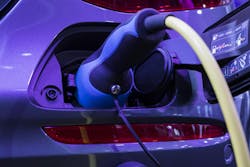DOE Announces $131M to Strengthen America’s Battery Supply Chain and EV Innovation
The U.S. Department of Energy (DOE) has announced more than $131 million for projects to advance research and development (R&D) in electric vehicle (EV) batteries and charging systems and funding for an advanced battery consortium to address critical priorities for the next phase of widescale EV commercialization.
The DOE has announced that 27 projects will receive $71 million to develop innovative and equitable clean mobility options, alleviating supply chain concerns for EV batteries and increasing EV drive range.
The selected projects are funded through DOE’s Vehicle Technologies Office (VTO) in the Office of Energy Efficiency and Renewable Energy and aims to:
- Lower the cost of EV batteries using inexpensive, abundant materials by developing long life-cycle, high-energy density lithium-sulfur batteries;
- Improve the efficiency and convenience of public transportation by developing and demonstrating system-level approaches to equitable mobility access;
- Advance on-board EV charging systems through the research and demonstration of innovative EV charging systems, including bi-directional charging;
- Increase EV drive range by developing sustainable lightweight materials, including door panels and EV battery enclosures.
The United States Advanced Battery Consortium (USABC) of Southfield, Michigan, will receive $60 million for pre-competitive, vehicle-related advanced battery R&D.
The consortium will focus on R&D for EV batteries with enhanced performance; EV batteries using earth-abundant and domestically available battery materials; light-, medium-, and heavy-duty vehicle batteries; and more cost-efficient battery recycling processes.
It will not only accelerate battery R&D relevant and responsive to the requirements of EV manufacturers but also contribute to the domestic battery supply chain and recycling ecosystem essential to meeting the demand for EV batteries.
The consortium will partner with key stakeholders like universities, national laboratories, and manufacturers supplying materials and components to the battery industry.
All applicants for both VTO funding opportunities were asked to include a community benefits plan addressing objectives to ensure that the benefits of a clean transportation system are shared equally.
Securing the domestic battery supply chain and developing innovative solutions to electrify the transportation sector support President Biden’s Investing in America agenda.
About the Author
EnergyTech Staff
Rod Walton is head of content for EnergyTech.com. He has spent 17 years covering the energy industry as a newspaper and trade journalist.
Walton formerly was energy writer and business editor at the Tulsa World. Later, he spent six years covering the electricity power sector for Pennwell and Clarion Events. He joined Endeavor and EnergyTech in November 2021.
He can be reached at [email protected].
EnergyTech is focused on the mission critical and large-scale energy users and their sustainability and resiliency goals. These include the commercial and industrial sectors, as well as the military, universities, data centers and microgrids.
Many large-scale energy users such as Fortune 500 companies, and mission-critical users such as military bases, universities, healthcare facilities, public safety and data centers, shifting their energy priorities to reach net-zero carbon goals within the coming decades. These include plans for renewable energy power purchase agreements, but also on-site resiliency projects such as microgrids, combined heat and power, rooftop solar, energy storage, digitalization and building efficiency upgrades.
